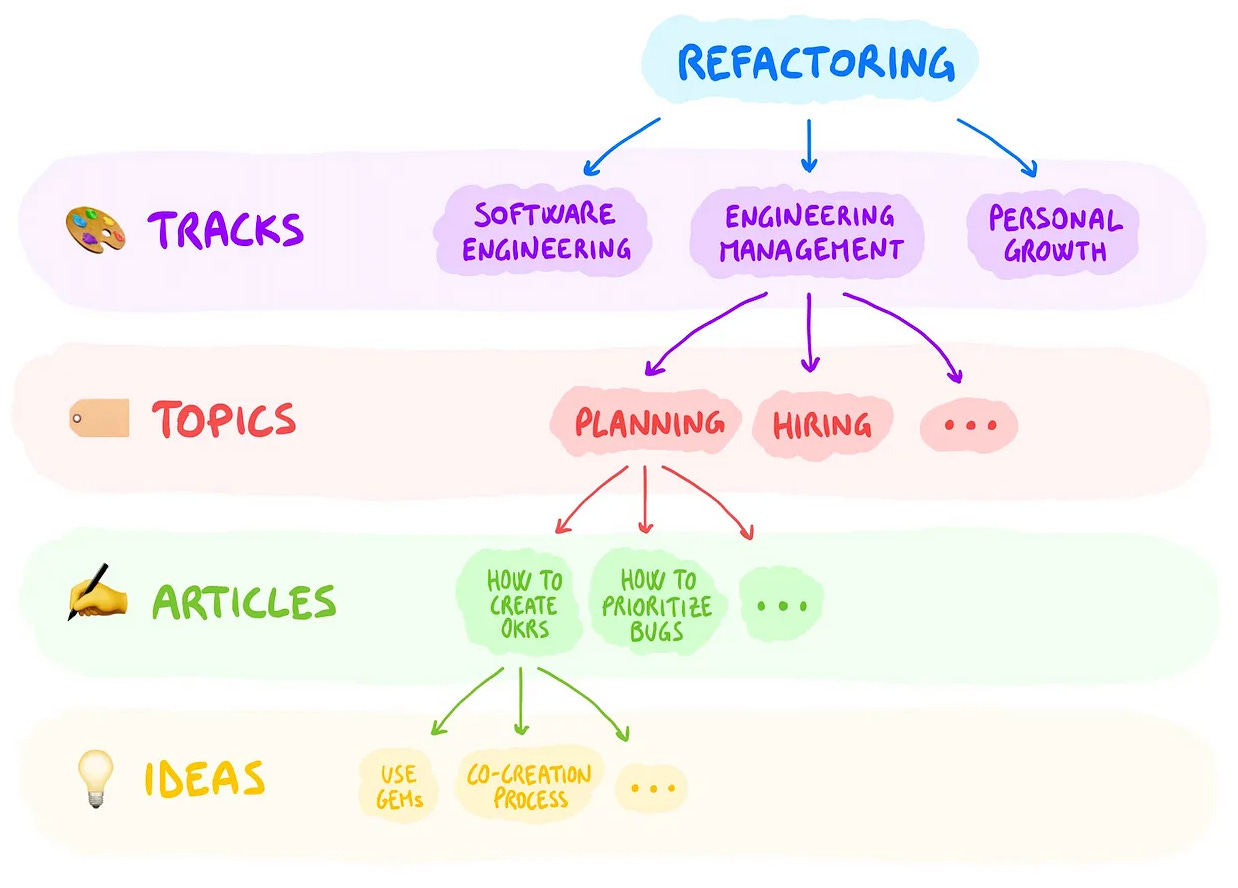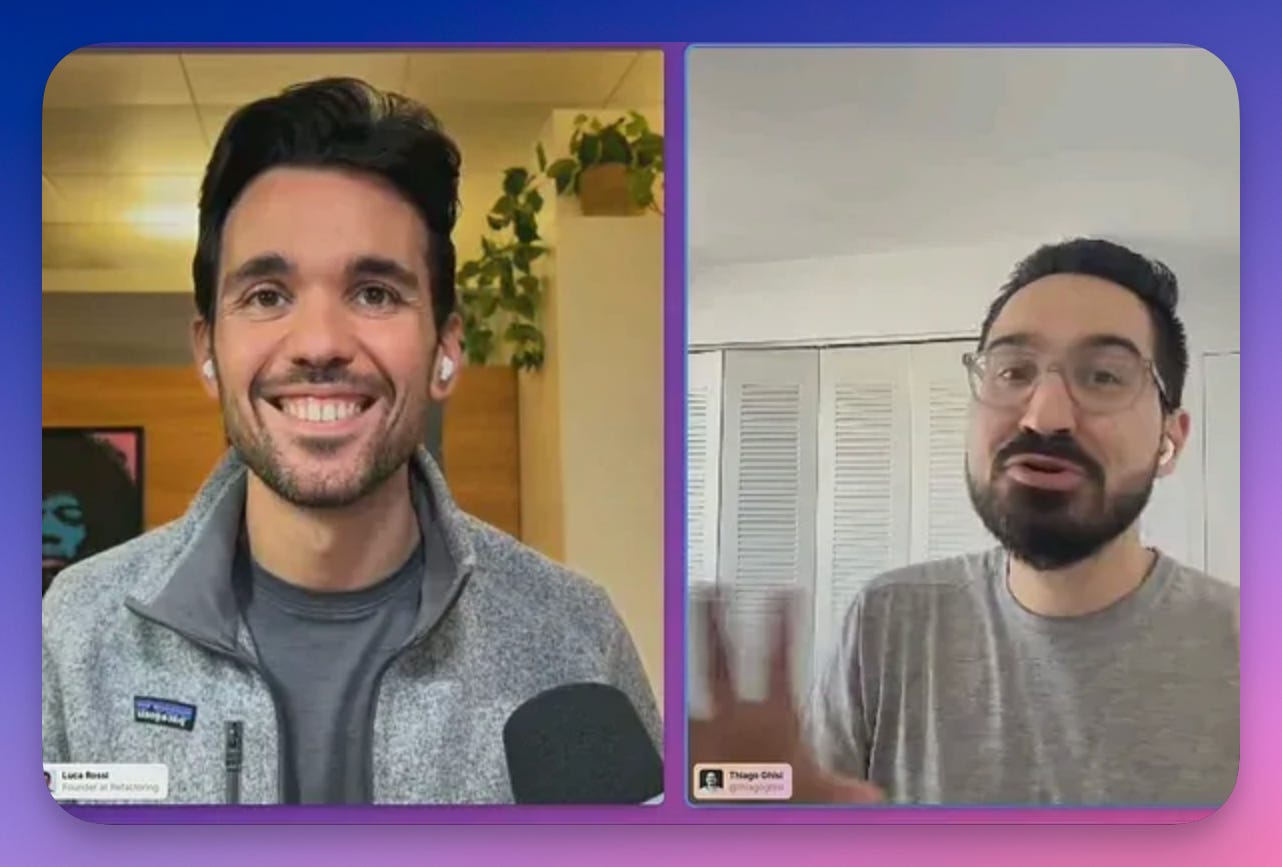Hey everyone! This is a special edition to announce the most important evolution of Refactoring since the launch of the paid plan.
It is the result of months of work and countless conversations with readers about how to make the newsletter better.
Today I am introducing three things:
🖼️ New Logo — an updated, yet familiar identity.
✍️ Guides, Interviews, and Books — three new types of articles that mix text with video, and theory with real-world stories.
💳 Pricing update — a week from now I will sunset the 20% founding discount and update the price for new subscribers to $15/month or $150/year.
Let me walk you through the changes!
If you wish to subscribe to the full version, for a few days you can still do so at the old $12/mo price:
🖼️ New Logo
I originally chose the 🌀 spiral as Refactoring logo because I like the iterative nature of the shape, and how it draws you to the center.
In fact, Refactoring is about iterating over things to make them better, and getting to the core of problems. Articles should be short, valuable, with no fluff.
Today I am introducing an updated logo that is the same spiral…but seen from the side! It adds a new dimension, just like, over these 2 years, Refactoring has gotten deeper and richer.
It also winks at the hand-drawn component of the newsletter ✏️ which is here to stay of course!
✍️ Guides, interviews, and book reviews
In 2.5 years I have published 150+ articles and curated 300+ resources on Refactoring, covering a lot of what I think you should know about software development, management, and personal growth.
My goal is to make you feel like you are putting your own growth on autopilot. Refactoring mixes short-form and long-form content, so that you can always find something for you.
Today I am doubling down by introducing new types of articles to add breadth and depth to what Refactoring covers, mixing text with video, and theory with real-world stories:
📖 Guides
🎟️ Interviews
📗 Book Reviews
Let me tell you more about them:
📖 Guides
In the Library, I organize the articles I write into 🎨 Tracks and 🏷️ Topics.
This helps me to keep my ideas organized and figure out if I am over indexing on some topic, while neglecting others.
For any of such topics — e.g. engineering metrics — I may have written between 5 and 10 articles now, each about some specific angle, so you may wonder — how do I get started?
To help with this, I am introducing 📖 Guides.
Each guide is a super article that acts as a primer about one topic: it is longer, it draws from previous pieces, and adds new content, references, and ideas from the community.
The first of such primers has been about engineering metrics, and has instantly become the most popular article of the year 👇
It is 4000+ words long, builds on top of ~5 other articles from the past, and features contributions from 10+ tech leaders, including founders and CEOs of top products in the space.
This is the level of quality that you can expect from future guides. You will also find each guide highlighted on its topic page in the Library:
I will publish about 1 guide per month. As a preview, here are the first ones that will come out:
📑 Writing Documentation — how to write and maintain technical, product, and company docs. How to define the minimum viable docs and make people happy to write them.
🚚 Continuous Delivery — how to setup an elite dev process to release fast and often, while keeping failures low.
🗺️ Planning Projects — how to break down work, mitigate risk, do good enough estimates, and finally meet deadlines.
🧰 Remote Toolkit — how to run a remote engineering team. How to optimize processes, reduce synchronous time, and nurture relationships.
🏯 Structuring Teams — how to design your team structure for autonomy and alignment, breaking down the roles and responsibilities you need based on your team size and product stage.
🎟️ Interviews
Refactoring articles usually cover frameworks and ideas that you can apply to your work.
From now on, I am pairing these with practical interviews with accomplished tech leaders, that will tell real-world stories from their experience.
You have already seen two of them:
👑 Tech Leadership across the Startup Lifecycle — with Andrew Twyman, Engineering Coach and former Staff Engineer at Dropbox.
🪴 How to Design a Great Tech Career — with Thiago Ghisi, Director of Engineering at Nubank.
And there are more to come!
Interviews are published as 1-hour videos, and accompanied by a full article that acts as a summary of the conversation, plus additional resources and ideas about the interview’s topics.
Interviews also double as community events where paid subscribers can join live and ask questions to guests. From now on you can expect ~1-2 interviews/month.
📗 Book reviews
My experience with non-fiction books is complicated.
I can name a few amazing ones that have changed the way I think about things, and many others that didn’t make for a good experience.
These weren’t necessarily bad books, but were often diluted — they felt like great blog posts, inflated into books. Or they were irrelevant — either because things in tech moved on from there, or because they talked about stuff that doesn’t apply to my job.
So I think I can help with this, in two ways:
🔍 Curate — select which books you should really read. Only the very best ones.
📌 Summarize — review them and turn them into a dense newsletter edition, to give you 80% of the value with 20% of the effort.
I read the books so you don’t have to — and if you like the summary, you will always be able to catch up with the real thing.
To begin with, a few weeks ago I published my review of Team Topologies. You can check it out below 👇
And it won’t be just about me. We started a 📗 Book Club in the community to drive book conversations:
Every two months we choose a book, read it, and discuss it together in a live event. I collect the best ideas and will publish a collective review in the following weeks.
💳 Updating Refactoring’s price (in a week)
A week from now, Refactoring’s price for new subscribers is going to become $15/month, up from $12/month that it’s been during this first year.
I am sunsetting the 20% founding discount because I believe the full price now reflects everything we have built together, and it backs my commitment to deliver top-notch content that puts your growth on autopilot.
Nothing will change for people who are already subscribed — they will stay at $12/month, or whatever plan they are on.
The price change will take place in one week, so, if you have been on the verge of subscribing, this is the right time to do so 👇
Thank you for supporting my work ❤️
Sincerely 👋
Luca










I'm new to Refactoring, and usually, I ignore Substack promo emails, but I see one (non-free) article I'm very interested in. I was on the fence about subscribing, but I can't justify the expenditure. The $150 annual price is higher than most media channels that I rely on daily. The Washington Post charges less for all-access digital. You're asking about 10x what might be reasonable. I wouldn't pay that much on Substack in total. I understand that you have to make a living, and if you find e ough devoted followers, yay you. But sorry, too bad for me, one unconverted customer for you.
Great progress and happy to see the structure!